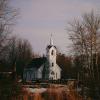
In the last stanza of this psalm (vv. 8-10), we are at the point where the prayer is finished or, since we have been making the link between prayer and worship, where the time of worship ends. In other words, the service is now over. We hear the benediction and are about to go back out into the world. What should have happened to us as a result of the time spent with God?

David's prayer is not only that he might be kept from evil, however. It is also that he might be kept from the company of evildoers, so he will not be tempted to sit down with them and “eat of their delicacies” (v. 4). This is like the two preceding psalms in which David asked God to keep him from the company and corruptions of the wicked. It is one reason why we should think of these psalms as being written by the same man. I repeat here what I said in the two earlier studies. It is not that David is too good for evil people; the problem is that he is too much like them and is therefore likely to be swept away by their wickedness if he is in their company.

In yesterday's study I wrote that true prayer is speaking to God and not merely going through some religious exercise. Have you noticed that this is exactly what David indicates in verse 2? He refers to some of the forms of worship practiced at the temple in his day, specifically the use of incense and the offering of the evening sacrifice. But he relates each of those practices to genuine prayer and the devotion of the worshiper.

In spite of his power and authority as king, David did not feel self-sufficient. He knew he was in peril every single day. Therefore, he prayed every day, and he prayed powerfully. His prayer teaches us to do likewise.

Psalm 141 is about prayer. In fact, it is a psalm in which every word and sentence is a prayer. It has been called an evening psalm or a psalm to be sung before retiring because of verse 2, where David prays, “May my prayer be set before you like incense; may the lifting up of my hands be like the evening sacrifice.” There are other psalms like this, particularly toward the beginning of the Psalter. Psalm 4 and Psalm 63 have been called evening psalms. Psalm 5 is a morning psalm. In the liturgical tradition of the church Psalm 141 has been used for vespers.

















